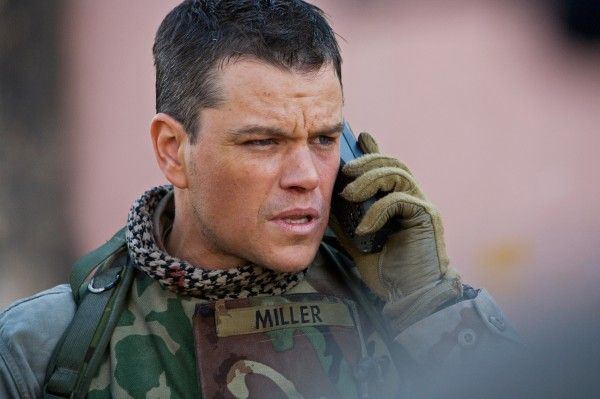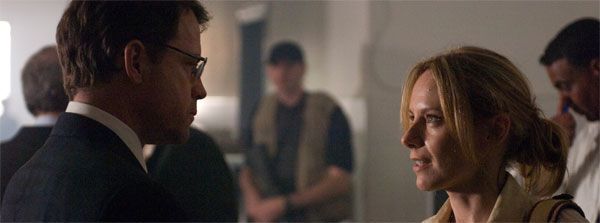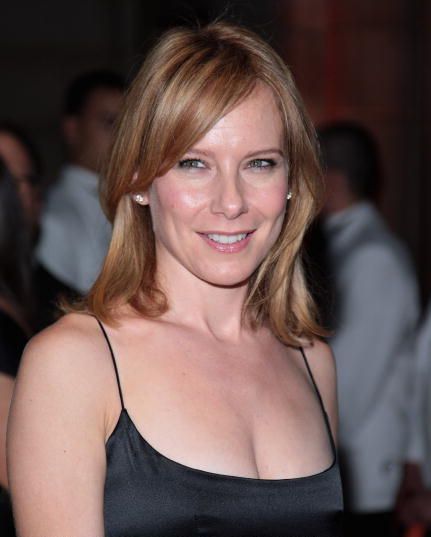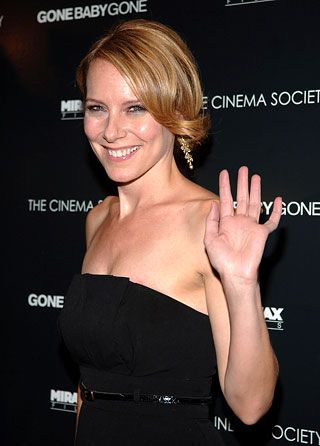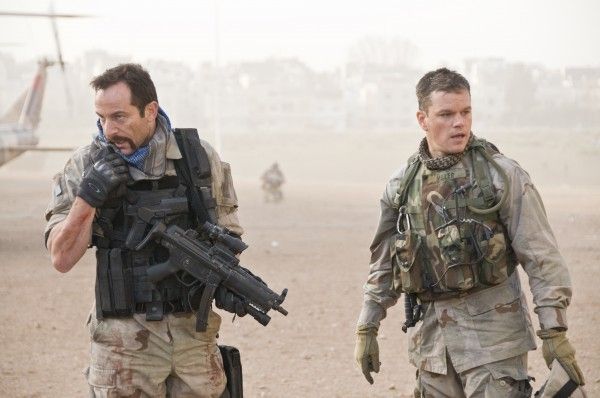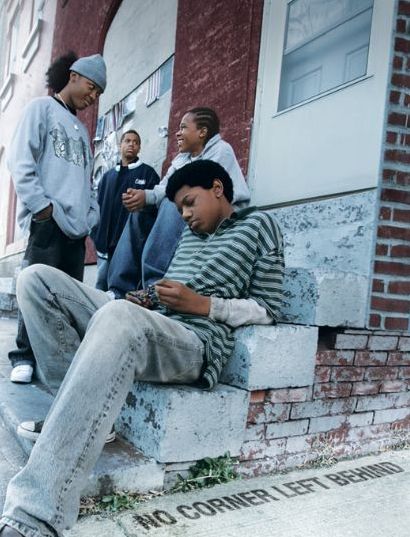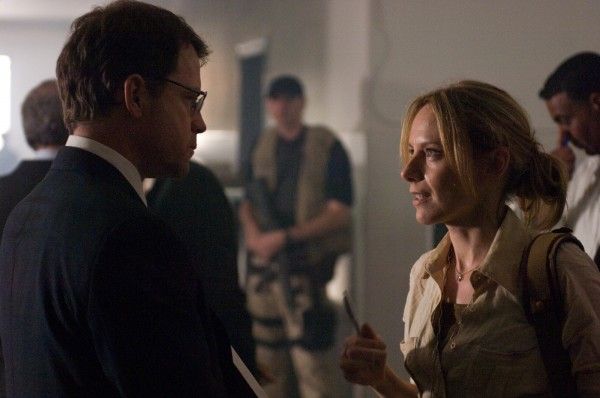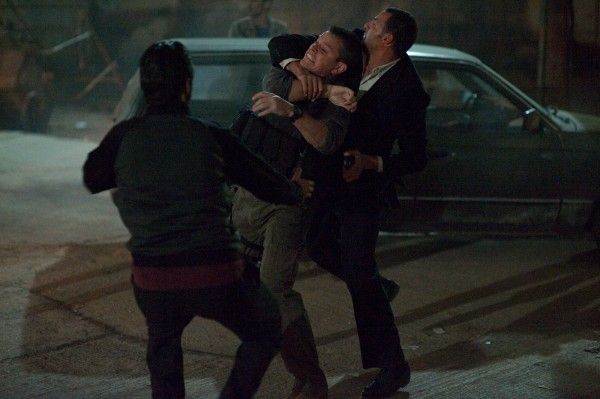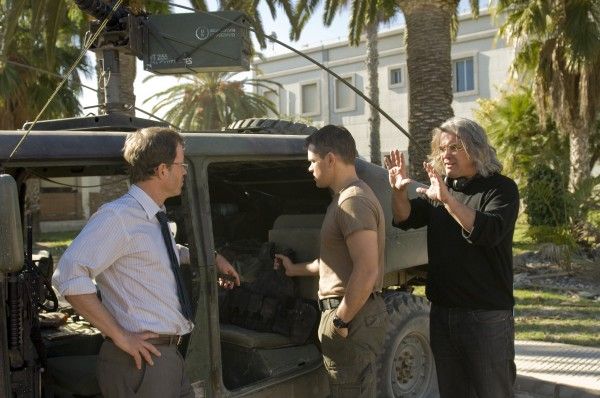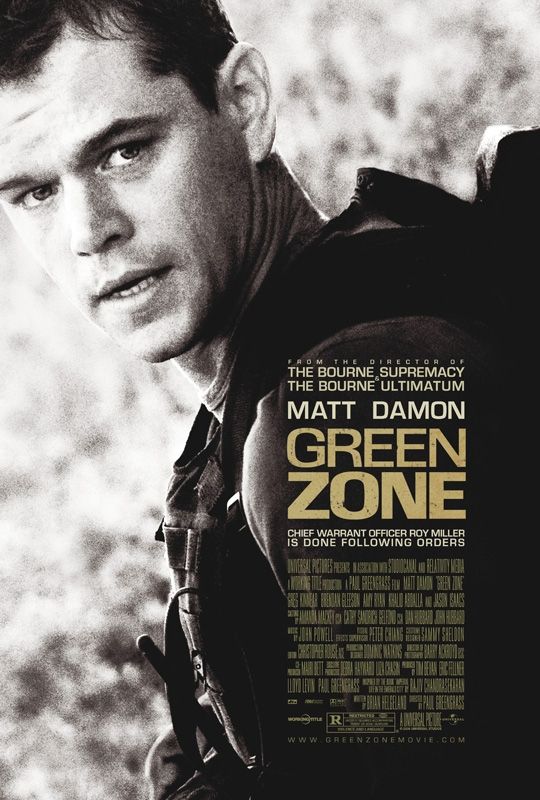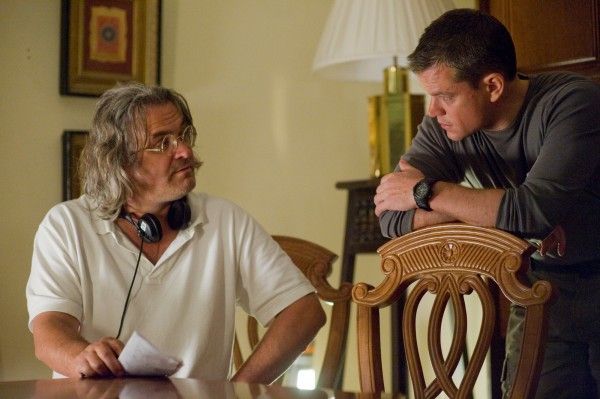After a long time paying her dues, Amy Ryan had a great decade. After all, anytime you're nominated for an Academy Award (Gone Baby Gone) and have a great part on one of the best shows in the history of television (The Wire), you've had a good run. But she's not sitting back and resting on past glory, as she plays a reporter in Paul Greengrass' new film Green Zone, and she's also in Philip Seymour Hoffman's directorial debut Jack Goes Boating - which premiered at Sundance a few months ago.
With Green Zone opening this weekend, I was able to participate in a roundtable interview with this great actress last week in New York City. We talked about making Green Zone, will she come back to The Office, her next project with Tom McCarthy called Win Win, and reveals David Simon asked her to be a part of his new HBO show Treme, but she was pregnant at the time.
It's a great in depth interview, so hit the jump and take a look:
As always, you can either read the transcript below or listen to the audio by clicking here. Again, Green Zone opens this weekend. Definitely recommended.
Finally, if you want to watch some clips from Green Zone before reading the interview, click here.
--
Question: So, did you go after the project or did this project come after you?
Amy Ryan: I heard about the project, but yeah, I went after it. It was actually just after the Globes and then the Oscars and so I felt like maybe I have a little bit of a chance here. [Laughs.] And I was talking to my friend Ben Affleck and I said, "Your friend Matt Damon's making a movie," but I had already been in the running for it apparently. But yeah, this was one to chase after.
We've heard a lot of improv is on these movies. How did you know about the character before you started shooting, and how did it change as you went?
AR: Well we had a script. We had a real beginning-to-end script which was beautifully made and structured, and the way Paul works is he takes that and uses that as the road map and the boundaries, and most of the scenes are in the script. A lot of it changed though. We got rid of a lot of things that maybe didn't feel like the truth at the time to where we were going, so where the improve comes into play is we will ... [Interruption] Sorry ... We'll meet in the morning, read over the scene we have and just kind of cherry-pick from that and then get it in our own words, go away and we pretty much rewrite it, either sometimes a whole page or just a minor detail, and then it was kinda locked down. But it was, Paul works mostly in collaboration, but it's about searching for the truth, it's not about just experimenting or being greedy.
Was your character based on someone real, and have you spent any time talking to any reporters who were in the field out there?
AR: No, my character's pretty much, she's a fictitional character, but she certainly represents the press at that time. Could've been a reporter from a UK paper, could've been the New York Times, could've been any number of outlets, but she pretty much represents the people who wanted to believe this to be true. And in the case, Paul and I, we decided what would be more interesting is finding a character who had spent their whole career writing about WMD, and here, here comes your big moment, and if you could cash in - be it for your career, your ego, whichever was driving Lawrie Dayne - that that would be more interesting. And then towards the end of the film, again, she also represents the hope of the press, of the people, who did go that extra mile to double-check and triple-check a source, and to get the real story out, to really search for the truth.
It must be tough though because obviously you have these press conferences and they're telling you this is the truth. What are you supposed to do, say "I don't believe it" when you're being told that and stuff? Did you ever have any kind of interaction with any of the reporters who were there?
AR: A friend of mine put me in touch with Anne Garrels, which is a friend of his, and she very generously talked me through just what her experience was as a reporter, as a woman, and even minor detail - what would be packed in her bag as she went out for the day, what her notebook what would like. When I first got her on the phone I thought, "Okay, she's going to tell me a lot about the politics," but straight away, she's like, "Okay, don't let them put you in army fatigues," and I thought, "We're girls, we're talking about clothes already." But the detail ... the same ... you meet people from the South, and they get upset when they see a Southerner depicted on the screen and a terrible accent. For her, she's like "Don't ..." The detail was important to her as well, and I really admired that.
What would be in her bag? What does a journalist bring into the Green Zone?
AR: Well let's see, what was in ...? We had pens and paper, and a bottle of water. There was the track phone they had - is that what it's called, that... My memory is fading me after a year and a half. And certainly her camera and food - food and water.
So there's all this action going on around you, and your character is a bit more mellow. Were you ever like, "I just really want to jump out of a helicopter"?
AR: Well, there were versions - there was a version where I died. And there was a version where I lost my leg. And one day, news came in that I lived, and I was kinda disappointed. (Laughs). I wanted to get in on that action, yeah. But it was fun, so instead I just walked with good strong purpose.
What was your reaction when you saw the final product? Were there a few scenes ...
AR: I gotta say, it was crazy, because we shot and - you guys may already know this - in London, Morocco and Spain, all doubling as Iraq. But some days we just had us, a Jeep and a big blue tarp over the doorway, and then when I saw the film the first time, there was Baghdad burning in the background, and there was even a palm tree that wasn't there, there were some people that weren't there, and that is truly just cinema magic, and that's a good reason to go to the movies. I heard Jason say before, and I agree with him, it's bigger than us, the story, and it deserves to be seen on a big screen.
What was your experience like on location? People were talking before about some of the different venues you were at. How did those particular environments strike you, and did you get a chance to explore a little on your own?
AR: Yeah, Morocco is an incredible place if you haven't been, if you don't know that yourself. It's, as a new Yorker, too, I remember going to dinner the first night, and you get dropped off in a car at the edge of the Medina, and they say, "It's that way," the restaurant, and you're walking down these dark, windy alleyways, and you think, especially as a woman, "This can't be good, this can't be good, this is gonna end really badly," even though there's more men in our group than women to protect us, but no, and then we go down another windy alley and then there's a knock on a door which you think you're leading to your death, and what opens up is the most incredible aroma and colors and music just pouring out, and this atmosphere is just - it's intoxicating - and you know, it's like none other. I love Morocco - it's a real challenge to all five senses. You think you know something, and you don't. It's wonderful. It keeps you on your toes that way.
You shot this film for many, many months. What was your level of commitment on this thing, and did you have to - did you leave the set, come back, leave, come back?
AR: Yes, we started - I think it was November - and coincidentally and luckily on the schedule I had a month off, so I was able to go to the Oscars. So went from Spain to L.A. and then after that I went back and joined them in Morocco, and then we went to London, and then we went away for about six months I think it was, because Matt went to film "Invictus" and "The Informant," and then we came back. So we always knew we had re-shoots because we also filmed this during, the writers' strike was on, so we had some obstacles in that way, so we knew we'd have to come back once it was settled and capture a couple of things here and there that we missed. So all told I think it was a year and a half of a commitment, but worth it.
So what's your experience been like post-Oscars because I mean, you've been a working actor for a long time, you know, you got that role, kind of broke out. You went to the Oscars and then you have to go back to being an actor and doing ... is it harder to go back to just doing the grind, or is it easier these days because of that?
AR: No, it's great to go through that, which is such a gift and such a fun party, but for me, I knew - get on the next plane, go right back home to New York. 'Cause you can't maintain that level of party (laughs) or expectations, that everyone will welcome you with open arms. You still have to go back and do the work if you want to be invited back again. But I went and I did "The Office" after "Gone Baby Gone." I wanted to really shift it up and find something fun - I mean funny rather - I wanted to try my hand at comedy and a skirt and having my hair brushed. (Laughs.) And then, of course, "Green Zone" was a big thing, and then I had a child. "Jack Goes Boating" was the next film that I worked on, with Philip Seymour Hoffman. We just premiered that at Sundance, and now I start Tom McCarthy's next film called "Win Win," and we're gonna start filming that next month.
What's that about?
AR: It's a story of a middle-class couple in Jersey who are under financial pressures, like pretty much the rest of the country right now, and how this young 15-year-old boy comes unexpectedly into their lives and how that changes their world.
Sounds very Tom McCarthy! You're one half of the couple?
AR: Yeah, myself and Paul Giamatti.
To go back to "The Office," obviously you're great at comedy. Do you think you're going to come back to the series?
AR: I you know I was telling Carrie the other night, I feel this responsibility. So many people want Michael and Holly to get back together, you know? It's almost like Sam and Diane! But I don't have plans to, but it's always something that I'd stay open to because it was so much fun, I had such a blast on that show.
What about more TV in general?
AR: If the script was right. You know for now I like, I live in New York with my family here, so if the situation were right and, again, if it was well-written.
Well speaking of well-written TV, I'd like to address "The Wire."
AR: I was gonna say, David Simon ...
When you look back on your work on that show, and the show in general, what are you ...
AR: I'm so proud! It's being taught at Harvard. That show is being taught at Harvard and Tulane, and so many other universities across the country and yeah, I just think it's phenomenal. I think about it standing the test of time and to be a part of that is ... As an actor, when I started out, it was just one thing - I just want to have a job. And then it turns into - I just want to have a good job, I want it to be a good role. And now if you, if you have all those things, and then it turns into something that matters, at the end of the day, it matters, and it affects people's lives, that's an incredible feeling.
Have you pitched him on why you should be on his new show?
AR: (Laughter.) He actually asked me, but I was pregnant at the time, so I couldn't join them. But his new show is phenomenal. I read that script and I don't know how much you know of it - "Treme" - it's about post-Katrina New Orleans, and I imagine that's what he was gonna ... I'm sure he's gonna take the same approach, you know, "The Wire," those are his work ethics, that's the way he writes. Story really matters first. I can't wait to see that one. And Wendell Pierce and Clarke Peters are in that as well.
You said that you like your work to actually mean something. Do you think that "Green Zone," do you feel that "Green Zone" has the potential to do that?
AR: Yes, yeah, absolutely, I mean I think "Green Zone," there's the element of just pure entertainment. You can go on this wild roller coaster ride of this action thriller, but I believe at the end of the day, it's either gonna ... People will say, "Well, what do I believe? What did I believe? What matters? Is it true? Is that how we got into this in the first place?" Because so many people didn't want to believe it, as we all know. I do think it'll matter. I guess it's about timing as well, when people want to face it or not.
Did you have the opportunity - I know your character didn't have a lot of interaction with a lot of the soldiers - but did you get to meet any of the soldiers, and what was that experience like?
AR: Yeah, they're ... That was humbling because here, there's an element of any job you're on - it's a lot of camaraderie, sharing stories and you're new best friends. And I remember one day, you know, here's our nice catered lunch, and here we are in sunny Morocco, and we all've got our fake sweat and dirt on, and I just looked over and it struck me for a moment: I said, "Oh, you know, I go home to New York after this. And they, some of them are going back for their third or fourth tours." And it stopped me, it really stopped me in my tracks. And I remember the day that we filmed the scene where we - where I meet Matt's character in the Green Zone by the swimming pool - and when the soldiers, when they came onto set and saw the pool - and it was pretty much pared-down for what you see in the movie because a lot of CGI was added - but they said, "This was there?" They're seeing the props of the Pringles and the Pizza Hut, and one of 'em's like, "I would've been fuckin' pissed!" (Laughter.) "No way, no way." And the same - and I just heard Matt tell a story that one of them said like, "So, you're telling me I've been shitting in a hole for a week, and these guys are eating Pizza Hut?" They were shocked, they were shocked. But they were an incredible group of guys.
Since you've worked with Ben and Matt now, can you compare and contrast working with them?
AR: And Casey! Don't forget Casey! He'd be pissed! (Laughter.) You know, it's interesting because I worked with Ben as a director, obviously, and Matt as an actor, so it's - there's no way to really compare, like what it's like to be in a scene. And I would love to know what that's like, I would love to work with Ben as an actor. I think that would be a great giggle. (Laughter.) But you know what they do have in common is they're both ferociously intelligent guys and really down to earth and really generous with what they know. You know, there's nothing worse when someone's smarter than you and they pause or they scoff when you ask a question, like, "You don't know that?" These guys don't miss a beat. They just, they bring you into the world. Yeah, there's something ... who else is from Boston? Who can I work with next? (Laughter.) Mark Wahlberg? I want to work with him next!
You have the accent already, so ... When you walked away from the set, did you feel a bit more savvy about political issues that are happening, did it change ...
AR: I think that's true on any movie. Tom McCarthy and I were just joking about this on ... One of the great perks of being an actor is you're only as smart as the job you're in, you know, and you're only as informed as the job you're in, and you do become an expert, and you read all the books, but then there's a part of like, you move on. So in Tom's movie now, it's a big theme of wrestling - high school wrestling - and so we're all becoming like, "Oh really, how many pins did he have?" Like, I never watch wrestling! But in the next two months I'm gonna be an expert on that, although I couldn't say I'm an expert on Iraq.
You were at this year's Sundance for your film. What was that experience like for you, now that you're a month away or removed from it?
AR: I, to see that film, I love that film so much. To get to see it with that audience and the audience take to it as much and really go with it and go with those characters as much as they did, it was very joyous. And it surprises ... I remember that movie came out from that first Q&A, or rather the second movie, the whole audience, they stood up, and they all stopped. And I thought, you know Phillip's seen it all, oh, Phillip must've seen it, he's had a lot of standing ovations in his career, and he too, it took his breathe away, and we felt good. They'd come with us, this story, this little odd, quirky story, and they were with us. It was intensely gratifying.
Did you have a chance to see other films at the Festival or was there more of promotion and my film?
AR: It was mostly promotion. We were in and out for like two, three days. But I did go see "Company Men." I went to go support Ben, and we missed each other. We were texting. He was backstage, and you know, the Sundance staff, the local staff, that I guess they volunteer, they don't mess around. I couldn't get backstage. (Laughter.) "I'm here to see Ben!" "No, no, no, he left! He left! He went out the back door." It was like Elvis left the building or something, oh my god. So I texted him, I'm like, "I can't find, I can't get to you!" So, but yeah, that's the only other film I saw.
I guess the other question is: He's known - Paul is known - for doing a lot of takes. And I'm curious: What was the most takes you had to do on any of your scenes, or were there any of shots that he was able to do in one take, he was like, "Yep, we got it, let's move on"?
AR: I don't remember any one takes, like Clint Eastwood, like we got the rehearsal. I don't - it never occurred to me that Paul did a lot of takes, any more than other directors. It felt like the norm. And then, we always had two cameras going at once because it's all handheld. It just felt like just another day on a - more than another take, it felt like we're just gonna keep picking it up and finding it in bits and pieces, so it didn't feel laborious in any way.
When you're working with two cameras, and you're working with cameras that are constantly on the move the way he films, does he tell you - obviously you're not supposed to look at the camera, you're not supposed to break the fourth wall - but does he almost say, "Don't worry about it," if you happen to do that? I'm just curious how that dance works?
AR: I think if that were to happen, you'd just quickly edit out or the other camera would be on Matt at that time or something, so it's not too much ... But the dance works where, if you're both, two actors walking down the hall and the camera's behind us but this one's gonna meet us, then that camera knows to duck out of site at that point. But also it does... In a scene when you're with the other actor, you can - this is us going into the unknown - but when the cameramen are also on-guard with you, you know, or on-point, it really feels like a company, and you might just feel like a slight hand on your back as you're like, just moving you. It's not disruptive, it's like, okay, great, well we are all here together. Or you might do that for one of the camera crews, like moving their mic cord out if your hand was out of shot, just all save it, because it is ... They are the big long shots that start at the staircase and down and someone's getting into a car ... There is a lot. After five takes you're climbing those stairs again, you're like, "Aw, shit." (Laughs.) It's a well-oiled machine. And also, sorry, it's the same cameramen from the Bourne movies, so they're all really well in-tune with each other.
After you do Tom's movie, are you trying to find quieter movies?
AR: You know, I never really know until I see it. You know, I can say, "Oh, it would be fun to be on a big-budget movie and have a nice big trailer, first-class this and that," but it's usually the script first. Like I never really read a script going "What's the budget?" or "How much money do they have?" Like, I'll read it. If it's ... Because you know, look at a film like "An Education," all these smaller films. You never know what is going to be the one that reaches through. So no, if it strikes me ... And always looking to try not to repeat. After "Gone Baby Gone," there was a lot of single mother, bad mother roles. Aw, that's, yeah, might try that again. Maybe in a few years, a different version of it or something but, so it's always trying not to do the job I just did.
Is there a role you're dying to do?
AR: I don't know, I always just say I want her to have an arc. I told a friend of mine, a playwright, I was like, "Write a play, and then at the very end, just change that man's part, just make it a woman's name. Shift it up so it's not just the girlfriend or the wife or the murder victim." I don't know if it's because that's something I now have in my bag of tricks or I'm able to do, but I feel like I've been lucky to work with directors like - that's what we're doing with Tom's script now. He offered that straight up. He's like, "I rewrite when I have the actors in mind, so know that I'm not precious about my script. So anything, however small, anything big, that strikes you ..." And his script already has changed. The character, some things minor, some things major, and we're still working on that until the cameras start rolling. It just happened to luck out that I have found these incredibly collaborative directors, which is really nice.
What do you understand to be the departure points of fiction from truth in "Green Zone" from your character's perspective? I know it's probably a composite of another journalist during that time, so...
AR: Yeah, so, what is truth in Lawrie Dayne's world, of what?
Of what transpires in the movie at least from your character's contribution to ... I mean, the particulars involved - I don't know how much of that stuff's been confirmed or widely regarded as true or how much of that was for the sake of storytelling, sort of?
AR: Right, well I think, I imagine you're speaking mostly of Judith Miller and her involvement and the articles she wrote for the New York Times, but again, it is, it's based on a fictional character. It could've been a man, could've been any outlet, but I think, again, it's hard to tell what is fact and fiction again. Like, how much are we gonna keep reading and what are our own ... I certainly brought my own opinions to it, what I believe to be true. But again, I had to approach it from the actor, the character's point of view. Like, where's her ego involved? Or if it is true? Like I don't believe anyone's purely evil. Like, "I'm gonna write this down to start a war!" But something made someone write something, and why did that happen? And that to me is what's most interesting: What would drive someone - is it just their career, is it as Matt's character says "because you want another Pulitzer Prize, you can't keep doing this, these things matter, you have to check." That's really the way I approached it. I didn't much go for what was fact and fiction out there as opposed to the world in our script, what we were saying and going from there.
Seems like from early message board posts and impressions and stuff, one half of the country might decidedly think it's agitprop or that it's some kind liberal Hollywood, anti-war ... How would you address something like that?
AR: Well to start with my character, I think she represents both sides because she starts out as someone who is that information, and then at the end that she represents the other side of reporters trying to get the truth out. I don't know, how would I address that to them? I think any movie - any movie that shows soldiers with helmets on - people naturally think there must be a side. You play war, you take a side. But I don't think this film takes side so much. Even the character Freddy, he goes up against Matt Damon, he says, "It's not for you to decide what happens in my country," so you even see it from that perspective. As Americans we keep going, "Well it's only a Republican side and a Democratic side," but over and over keep forgetting about the other country's side. I like that the film brings that point up.

